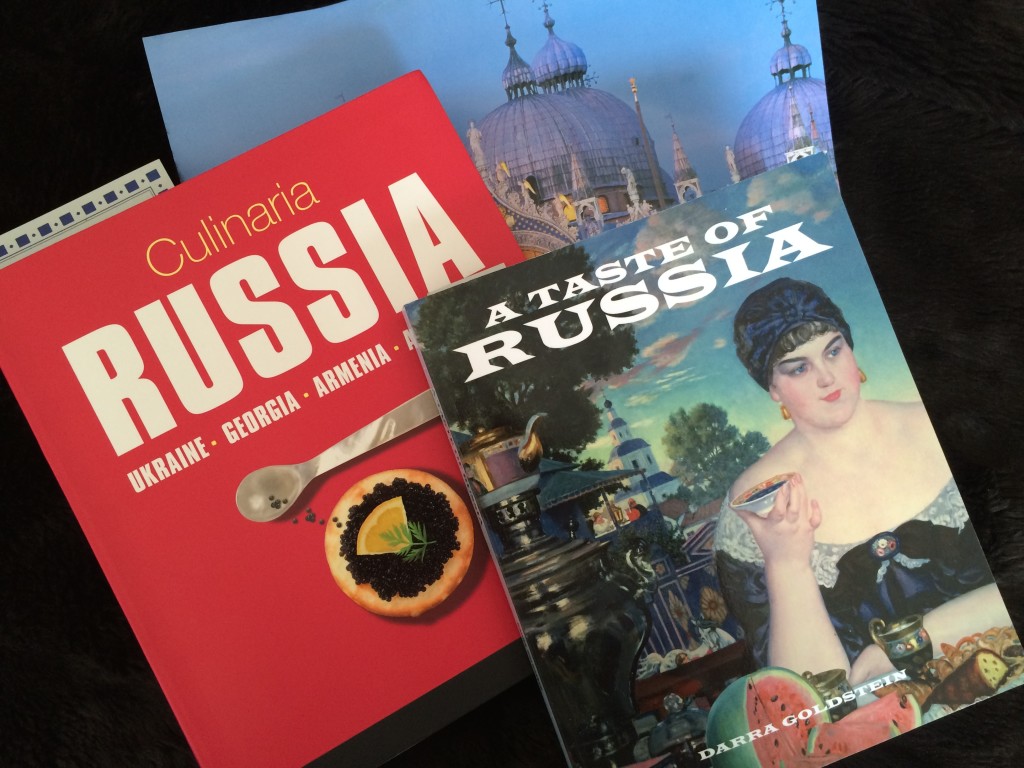 *Given Russia’s prominence in the news and the murder of Boris Nemtsov, we have a few more “All Things Russia” posts for this week! See links below.
*Given Russia’s prominence in the news and the murder of Boris Nemtsov, we have a few more “All Things Russia” posts for this week! See links below.
If it hadn’t been for the Cold War, Darra Goldstein’s A Taste of Russia (1983) would likely have received a favorable review in The New York Times.
In fact, the Times had scheduled to run a piece doing just that, until, Goldstein writes, “as luck would have it, the Soviets shot down the KAL jetliner on publication day, accelerating hostile sentiments”, thereby halting publication of the review.
Published during Ronald Regan’s presidency in 1983, when the U.S. and Soviet Union were “still locked in the Cold War”, Goldstein’s book provides a plethora of historic information and recipes on Russian cuisine, featuring everything from borsch to blini.
Including two prefaces – one from the year it was published and the second from a 1999 edition – Goldstein offers an authentic glimpse into the culinary landscape of Russia and the Soviet Union, both “before and after” Mikhail Gorbachev’s “perestroika” ushered in a more relaxed and open atmosphere.
In doing so, she provides readers with a sense of just how radically life has changed in Russia since 1983, when, as she explains:
“The Soviet Union suffers from a chronic food shortage, and Russians more often dine on buckwheat groats, canned peas and cabbage soup than on a cut of meat. Food distribution is based on a system of hierarchies, in which Moscow, most prominent and visible to Western eyes, receives propriety over all other Soviet cities. Next on the ladder come the capitals of the larger republics, along with the military and scientific centers, and so on down the rungs, until the smallest rural villages receive their meager allotments, which provide for only the barest necessities.
“Even within these city allotments, there exists a hierarchy of privileged positions and special stores. The system is a complicated one, but the point is that some people are able to eat much better than others. And the reason is not simply a matter of money, as in Western society, but rather of influence or pull, or blat, as it is called in Russian. In Moscow especially, there are special stores closed to the general public that sell everything from fresh caviar to ketchup.”
She concludes:
“So while it is possible to eat well in the Soviet Union today, one must not forget the extremes of inconvenience, connivance and expense people are often driven to for items as basic as a few oranges, sausages or even a liter of milk.”
“The effort of shopping is enormous, making the Russians’ hospitality all the more generous. One wonders how many Western families would regale guests so lavishly if they had to go to even half the trouble.”
After “perestroika”, however, “trendy new restaurants” (i.e. McDonald’s, Pizza Hut) began to appear, “replacing lackluster Soviet eateries.” And shoppers, who “often had to stand in three separate lines to make a single purchase” were now able to “run to the store for a forgotten item” with ease.
Furthermore, “home cooking has been resurrected as a pleasure and a pastime, and the Russians are devising innovative twists on the old classics…many Russians now consider rice pilafs, lamb kebabs, and hot spices as much a part of their cooking as cabbage pies and hearty soups, and palate-tingling dishes are becoming increasingly common. Even street-food vendors offer more than the once-ubiquitous fried meat pies and doughnuts.”
Yet, despite all the changes and improvements, the one thing that has remained constant is Russia’s culinary hospitality. Goldstein writes:
“Still, I have to admit that over all these years, no matter what the circumstances – whether I visited Russia as a student, tourist, government employee, professor, journalist, or honored guests – food has been, and remains, the visible demonstration of Russian hospitality.”
And so, we leave you with the words written by Nikolai Gogol in the short story collection Evenings on a Farm Near Dikanka:
“When you come for a visit, we’ll give you melons the likes of which you’ve never tasted! And you’ll find no better honey in any other village. Why, when we bring in the honeycomb, the scent fills the room! You can’t imagine it, our honey is pure as the Tsarina’s tears, or the clear crystal of her earrings. And the pies, what pies my old lady will feed you! If you only knew, they’re sugar, pure sugar! and the butter brims on your lips when you bite into them!…Did you ever drink kvass made from ears and blackthorn berries? Or vodka infused with raisins and plums?…My friends, what glorious flavors there are in the world! Once you start eating, you can hardly stop…ah, sweet nectar of life! Why, only last year…But what am I prattling on about? You’ll just have to come see us, come soon! We’ll feed you such treats you’ll tell all the world.”
Continue delving into All Things Russia with our previous posts:
- “‘Putinology’: Decoding the Russian President’s Mind”
- “From Russia With Love”
- “Nostrovia!”
- “Vodka: The Russian Spirit”
- “I Can See Russia From Here!”
- “A Glimpse Into Russia’s Imperial Romanov Family”
- “The Colorful, Contradictory, Crazy Comrade Khrushchev”
- “Once Upon a Time in Mari Vanna: A Russian Restaurant”
- “Borscht, Borsch or Borshch?”
- “Tea Time With Podstakanniks on the Russian Railway”
- “‘Pop’ing Into Warhol’s World”